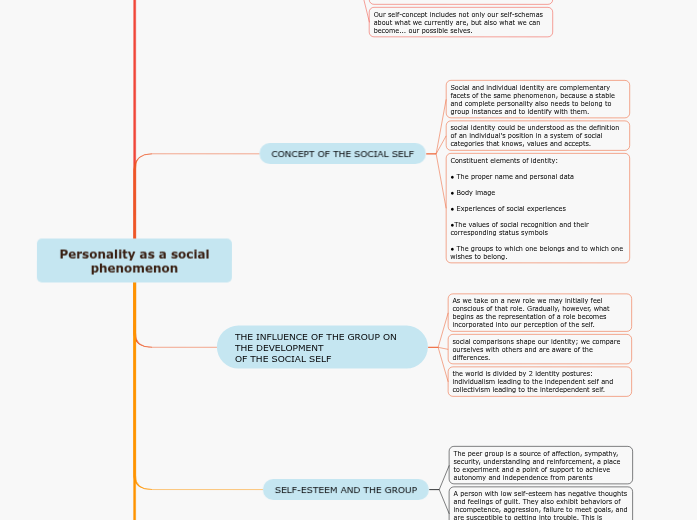Personality as a social phenomenon
SELF CONCEPT
The elements of your self-concept, the specific beliefs by which you define who you are, are your self- schemas. Schemas are mental patterns that organize our world. Our self-schemas, that is, the way we perceive ourselves.
The self influences memory thanks to a phenomenon known as the self-reference effect: when information is relevant to our self-concepts, we process it quickly and remember it well.
Our self-concept includes not only our self-schemas about what we currently are, but also what we can become... our possible selves.
CONCEPT OF THE SOCIAL SELF
Social and individual identity are complementary facets of the same phenomenon, because a stable and complete personality also needs to belong to group instances and to identify with them.
social identity could be understood as the definition of an individual's position in a system of social categories that knows, values and accepts.
Constituent elements of identity:
● The proper name and personal data
● Body image
● Experiences of social experiences
●The values of social recognition and their corresponding status symbols
● The groups to which one belongs and to which one wishes to belong.
THE INFLUENCE OF THE GROUP ON THE DEVELOPMENT
OF THE SOCIAL SELF
As we take on a new role we may initially feel conscious of that role. Gradually, however, what begins as the representation of a role becomes incorporated into our perception of the self.
social comparisons shape our identity; we compare ourselves with others and are aware of the differences.
the world is divided by 2 identity postures: individualism leading to the independent self and collectivism leading to the interdependent self.
SELF-ESTEEM AND THE GROUP
The peer group is a source of affection, sympathy, security, understanding and reinforcement, a place to experiment and a point of support to achieve autonomy and independence from parents
A person with low self-esteem has negative thoughts and feelings of guilt. They also exhibit behaviors of incompetence, aggression, failure to meet goals, and are susceptible to getting into trouble. This is reflected in their behaviors and attitudes towards others and life.
DISTORTIONS IN THE PERCEPTION OF THE SOCIAL SELF
When we are asked why we have felt or acted in a certain way, we give plausible answers. However, when the causes and determinants are not obvious, our explanations are usually wrong. Factors with a large effect, we sometimes report as innocuous; and others with little effect, we sometimes perceive as influential.
Studies of perception and memory indicate that we are more aware of the results of our thinking than of the process of thinking. In probing our mental sea we manage to contemplate little beneath its conscious surface.
optimism defeats pessimism when it promotes self-efficacy, health and well-being. However, a dose of realism can save us from the dangers of unrealistic optimism.
